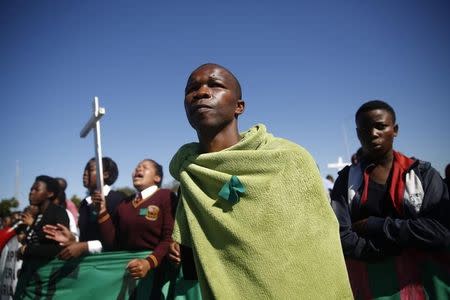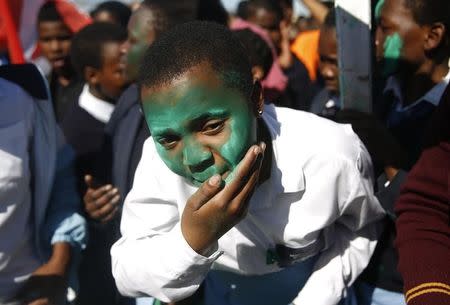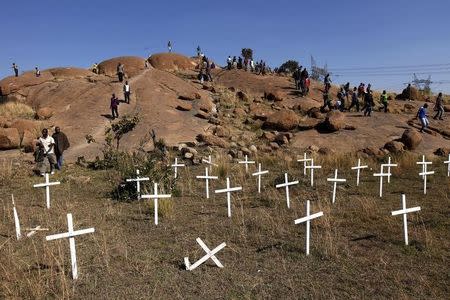South African probe blames Lonmin, police, unions for "Marikana massacre"- report
By Peroshni Govender and Tiisetso Motsoeneng JOHANNESBURG (Reuters) - An inquiry into South Africa's worst police killing since the end of apartheid blamed a mining company, police and unions for the "horrendous tragedy", President Jacob Zuma said on Thursday. The 2012 "Marikana massacre", where 34 miners were gunned down, shocked the world. The police, mining companies, unions, the ruling African National Congress (ANC) and Zuma all came under intense public and media criticism. The investigation, headed by retired judge Ian Farlam took nearly three years. The report of its findings is more than 600 pages long. It found that allegations that Deputy President Cyril Ramaphosa had used his influence to trigger the police action were "groundless". Ramaphosa, seen as the potential successor to Zuma, was a non-executive director at Lonmin during negotiations to halt a wildcat strike that led to the killings. "He had no reason to believe that the South African Police Services would launch the precipitate, ill-planned and poorly commanded operations," the report said. "There is no basis for the commission to find that Mr Ramaphosa is guilty of the crimes he is alleged to have committed." In a televised address, Zuma said: "The Marikana incident was a horrendous tragedy that has no place in a democracy". The report found that Lonmin , the world's fourth-largest platinum producer by value, "did not use its best endeavours" to resolve a wage dispute with workers. It also found that the Association of Mineworkers and Construction Union (AMCU) lost control of its members. "They sang provocative songs and made inflammatory remarks which tended to aggravate an already volatile situation," Zuma said, quoting from the report. He slammed the National Union of Mineworkers (NUM), a key ally of his ANC, saying they did not persuade Lonmin to speak to workers and failed to ensure that their members acted lawfully. The commission found a police plan to disarm and disperse miners was defective and the operation should not have taken place. "It would have been impossible to disarm and disperse the strikers without significant bloodshed," Zuma said. REVISING PROCEDURE The commission recommended that a panel of experts be set up to revise public-order policing policies and investigate "the world's best practices" for crowd control "without resorting to the use of weapons capable of automatic fire". It has also called for a criminal investigation of the police officers involved in the incident and an inquiry into police chief Riah Phiyega's ability to hold office. A total of 44 people were killed in the violence associated with the strike at Lonmin and the report recommended that the 10 other deaths before the "Marikana massacre" also be investigated. A lawyer for Muzi Msimang, acting for injured and arrested miners, said they are exploring instituting civil claims. Lonmin said the report was a "vital step in the healing process" and the NUM said it would bring closure to families who lost their loved ones. (Additional reporting by Ed Stoddard; Editing by James Macharia, Larry King)





